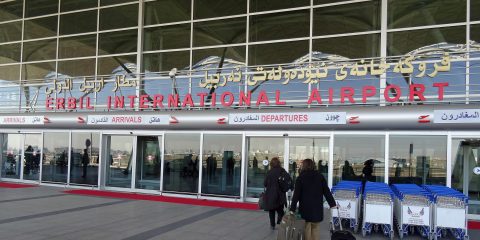‘They Will Have to Die Now’ – With the Kurdish pesh merga on the road to Mosul
Before dawn on a Sunday late last month, a battalion of pesh merga soldiers — about 600 Kurdish men, along with a few women — gathered in the shadow of Bashiqa Mountain, on the western edge of the autonomous region of Iraqi Kurdistan. They were sons, daughters, fathers, grandfathers. They wore an assortment of camouflage […]James Verini writes for The New York Times:
Before dawn on a Sunday late last month, a battalion of pesh merga soldiers — about 600 Kurdish men, along with a few women — gathered in the shadow of Bashiqa Mountain, on the western edge of the autonomous region of Iraqi Kurdistan. They were sons, daughters, fathers, grandfathers. They wore an assortment of camouflage fatigues and traditional Kurdish flowing pants, waist sashes and head scarves. They carried antique Kalashnikovs and new assault rifles. Few had helmets, and fewer had body armor. Strapped to their backs and belts and legs were daggers, revolvers, axes. Some of them had received the call to duty only the day before and were driven to the front by family or rode overnight in taxis.
The operation to retake Mosul had finally begun one week earlier on Oct. 16. The pesh merga led the charge toward the city, Iraq’s second-largest and ISIS’ last citadel in the country. Mosul had become the focus of the world’s attention, and the battle for it had been criticized even before it began. In the second presidential debate, Donald Trump complained that in revealing its designs on Mosul, the international anti-ISIS coalition was telegraphing its punches. This was inevitably true — not even ISIS had ever doubted that Mosul would be invaded — but it was also true that the first flurry of blows was too big to duck. Embedded in the column was a unit of American Special Forces, in a cluster of MRAPs. They were there, it was understood, to pick out targets for airstrikes. Rumbling in the distance, the bombs had deposited on the horizon a dome of inky vapor.
While the pesh merga attacked ISIS from the north and the east, the Iraqi military was approaching from the south. The job of the battalion moving toward Bashiqa was to shore up the eastern front and extend a cordon around Mosul. The Iraqis’ next moves would depend in part on the Kurds’ success. For the moment, in other words, the progress of the central conflict in the Middle East had come down to this unlikely troop.





